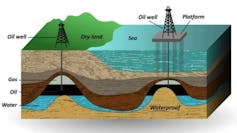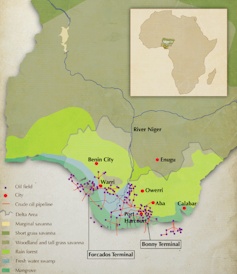
The water that comes out of the ground along with oil and gas during oil and gas exploration and production operations is anything but clean.

This wastewater, known as “produced water”, is often heavily contaminated with salt, oil and grease, as well as potentially dangerous compounds. Some are linked to lung, skin and bladder cancer in humans. These compounds can also harm or kill aquatic life.
So, the act of producing energy compromises another key element of human and environmental health: water. This won’t change any time soon. The Produced Water Society, made up of oil and gas professionals focused on water quality, forecasts a doubling in produced water volumes globally over the next ten years
Adequate wastewater treatment systems are crucial to ensure that produced water does less damage. Proper treatment means the water can be recycled and reused for irrigation, livestock and in other industries. In this way, it won’t be entirely wasted and humans will be far safer.
There are global standards for such systems. But in oil rich countries in sub-Saharan Africa – such as Nigeria – there is little to no adherence to such standards. Studies show, too, that most of the treatment systems are tailor-made for the removal of a few families of compounds, in order to achieve the specific treatment objectives of each production site in this region.
In recent research, we studied samples of produced water from an oilfield in Warri, in Nigeria’s Niger Delta Region. The samples were examined before and after treatment. Our findings were troubling: dangerous compounds were present at far higher levels than permitted by global standards. The treatment process wasn’t robust enough to filter everything out.
Damage done
The Niger Delta region produces some 2 million barrels (320,000 cubic metres) of oil a day and has always accounted for more than 75% of Nigeria’s export earnings. Together oil and natural gas extraction comprise 97% of Nigeria’s foreign exchange revenues, 80% of government’s annual revenue and 70% of budgetary expenditure.

But despite the fact that the oil industry has contributed significantly to the nation’s prosperity, the producing regions have suffered severe environmental damage. The people who live there have been subjected to untold hardship through oil pollution, environmental degradation, destruction of aquatic life, and other negative activities as a result of unhealthy extraction and treatment of oilfield waste.
A number of studies have reported various effects of exposure to heavy metals and organic pollutants from produced water discharge. There have been numerous anecdotal reports of health complications that are attributed to oil and gas operations in this region.
Most reservoirs in the Niger Delta oil fields are in a mature stage of their productive life. This means they tend to produce less oil and more water. So they could discharge more toxic contaminants into the environment, doing more ecological harm.
There are no regulatory guidelines to guarantee that an increase in produced water does not cause additional environmental and health hazards. There is also very little data available about the quality of existing produced water. Without this sort of information, it’s impossible to scientifically evaluate the risks and potentially negative effects of produced water in the region. That’s what prompted our research.
Worrying findings
We took samples of untreated and treated produced water from an onshore operational production facility situated at Warri, Delta State in accordance with Environmental Guidelines and Standards for the Petroleum Industries in Nigeria. Then we analysed levels of heavy metals, organic compounds and aromatic compounds in the water.
The comparison of the concentration with allowable discharge standards showed that produced water contained several different contaminants with varying concentrations before and after treatment as a result of inadequate treatment from the treatment facility.
One worrying finding was that phenol discharge was four times greater than the globally set limit. Phenols are aromatic compounds that act as carcinogens in the human body; even at low concentrations they can damage red blood cells and the liver. They’re also potentially deadly for aquatic creatures.
Heavy metals like iron and nickel were also present in far higher quantities than global allowable limits of discharge. That poses a serious threat to the aquatic environment and agricultural resources, which in turn affects the livelihoods of people in the Niger Delta region.
Additional findings indicate that the treatment technology mainly focused on just one group of hazardous components and was specific to each production site.
Operational discharges from the oilfield remain a public concern because contaminants continue to flow into the sea, creeks and farmlands from many widely dispersed sources.
The solution in the Niger Delta Region could be to apply integrated water treatment processes that address a variety of pollutants.
Environmental bodies should collaborate, as they do in the North Sea and the Gulf of Mexico, to ensure that produced water in Nigeria is properly managed.
By: Dr Kingsley Amakiri
University of Huddersfield
[logo-slider]



